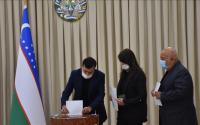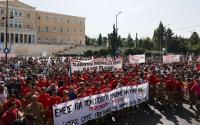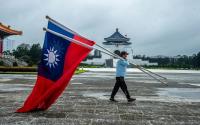Torture, treachery and spies - covert war in Afghanistan America may be carpet-bombing Afghanistan. But the real battle for power is being waged with bundles of cash and more sinister means The Observer, Sunday November 4, 2001The men were sitting in a circle with their weapons beside them. One, a balding 47-year-old, was the centre of attention. Hamed Karzai, an urbane American businessman and a leader of one of the key Pashtun tribes, was gathering the clans.
He had entered Afghanistan nearly a month ago, travelling from the Pakistani border city of Quetta across the rocky mountains that line the frontier and, on remote tracks too rough even for a four-wheel-drive jeep, deep into the rugged hills of the central Oruzgan province. There, in the desperately poor ancestral homelands of his branch of the Pashtuns, he began trekking from village to village, rallying for the attack he planned to launch against the ruling Taliban to clear the way for a return for the exiled king.
But last Thursday it was the Taliban who attacked him. Halfway through a traditional jirga - the debate by which a consensus among tribal leaders is reached - the alarm went up in the village of Dehrawut. Fighters from the Islamic militia were entering the town.
Karzai and his men escaped after a fierce gun battle during which, according to American military officials, US jets acting on a pre-arranged plan fired missiles at their opponents. Karzai is now in hiding, working his way across the hills towards the safety of opposition-held territory or back to Pakistan. He last spoke to his family at 11.10pm on Friday night. They were optimistic that he would make it unscathed. But his plan failed.
It was the second time in as many weeks that such an operation had run into grave difficulties. Ten days ago Abdul Haq, another prominent Pashtun opposition leader, was killed by Taliban forces after his own attempt to foment revolt, sanctioned and supported by American intelligence agencies, met with disaster.
Haq's frantic calls to the CIA resulted in a single unmanned aircraft firing missiles that missed the attackers, and he was executed soon after being captured. Now, for the first time, the efforts of the Americans to collapse the Taliban from the inside have been laid bare.
While the B52s and the F14s have rumbled and howled through the clear skies over Kabul and Kandahar, a quieter conflict has been taking place, pitting the intelligence services of the US-led coalition against the those of the Taliban. It is being fought in the air-conditioned lounges of the luxury homes of the top Afghan commanders, in the panelled chancelleries of foreign ministries, in dark corners of filthy bazaars and in rooms with mud floors in timber-roofed Afghan huts. But, though there is no obvious battlefield, it is a war as fiercely fought as its more overt counterpart.
Though on the map Afghanistan divides nicely - in the north there is the opposition alliance, largely composed of Afghanistan's ethnic minorities, across the rest of the country are the Taliban, largely drawn from the Pashtun tribes which predominate - the ground reality is far more complex. It is a shifting three dimensional jigsaw of tribal, religious, ethnic and political allegiances, both national and international.
But where conventional military planners see challenges, less conventional operatives see opportunities. The warriors in the secret war are the spies and specialists of a dozen nations, ranging from Turkey to India, all vying for some advantage in the new 'Great Game'.
It's not a new situation. Just over a century ago the region was the playing field for the first 'Great Game' - fought out between the Russians and the British Raj. Both tried to manipulate Afghanistan for their own advantage through secret agents, subsidies and, only in the last resort, military intervention. The aim was to secure a government in Afghanistan that was in their own strategic interests. Now, as giant American bombers continue to pound Afghanistan, the second great game has secretly kicked off on the ground - with exactly the same motives for those involved.
This time, however, there are dozens of players. And, like the Afghans themselves, they too form a complex and shifting helix of agendas, interests, alliances and enmities.
The biggest players are the Pakistanis. With their large Pashtun population and sense of strategic insecurity, they are determined to secure a government in Afghanistan that is to their liking. Partly this is for commercial reasons - to access the big untapped markets, and oil and gas reserves, of Central Asia. Partly it is because Pakistani military planners, fearing an attack from India, say that 'strategic depth' (ie somewhere to retreat to) is essential.
Islamabad's military intelligence services, the ISI, have unparalled connections in the southern, Taliban-held parts of Afghanistan and, as the ISI were instrumental in creating the hardline Islamic militia, they are also the only people with contacts at the heart of the Taliban's leadership and thus any putative breakaway faction.
Islamabad has also traditionally been close to Saudi Arabia. Both are Sunni Muslim countries who have always been keen to restrict the influence of Shia Muslim Iran. Without the assistance of the two states the Taliban would never have grown so swiftly. Iran, predictably, has backed the opposition to the Taliban, funnelling aid to the Persian-descended Shia Muslims in the west of Afghanistan. In recent months Tehran has also helped train and arm the forces of Ismail Khan, one of the most promininent opposition leaders, in camps around the eastern Iranian city of Mashhad. Uzbekistan has helped General Abdul Rashid Dostum, himself an Uzbek, with funds and weapons. They too are worried about Pakistani and Saudi influence. So is Tajikistan which has helped the Tajik forces who have been holding out against the Taliban in the north and east of Afghanistan.
Bigger players are based further afield, with Russia and China both concerned about the Taliban's potential for spreading Islamic extremism into their own territory. Turkey has a natural affinity with the Turkic-descended Uzbeks. They sent 90 military advisers to Afghanistan last week, who are to fight alongside Dostum. A secondary aim of the Turks, and the Uzbeks, is to counter the Persian and Iranian influence in the region. India, which has sent money and a military delegation to the Afghan opposition, just wants to make sure that Pakistan doesn't gain - whatever it takes.
'The idea of anybody committing sizeable quantities of ground troops is anathema. It's a road to diplomatic and military disaster. Instead they do it with secret supplies and spooks,' one Western diplomat in Islamabad said last week. The overall losers, of course, are the Afghans.
The Taliban's fearsome intelligence agency is known as the Istakhbarat. For the past three years it has been run by Qari Ahmedullah, the hardline former Interior Minister. He reports directly to Mullah Omar, the reclusive one-eyed cleric who leads the Taliban from the southern desert city of Kandahar.
The Istakhbarat uses the facilities, offices and often even the former personnel of Khad, the feared KGB-trained secret police set up by the Communists when they were in power.
Qari Ahmedullah has been ruthless in cracking down on potential discontent, imprisoning and executing hundreds of alleged conspirators over the last three years. According to refugees interviewed in Peshawar, the former Khad torture centres in the Shashdarak quarter in Kabul are full of sobbing, screaming victims. So is the infamous Pul-e-Sharki prison on the city's outskirts.
In recent days the Istakhbarat have arrested dozens of people in Jalalabad who, they claim, were working for the return of Zahir Shah, the exiled king. There have also been similar purges in Kabul - where the Istakhbarat foiled an attempt by opposition forces to smuggle hundreds of guns into the city - and in the eastern city of Khost where, before the US-led air strikes, local tribes looked to be wavering.
Tactics similar to those used against Haq were employed. The Taliban drew out potential dissidents with offers of discussions and compromise. Then they were rounded up, imprisoned and their houses were demolished. The Taliban are no strangers to such 'black operations'. Over the past three years a series of opposition leaders have been assassinated at their homes in Pakistan. Abdul Haq's own wife and son were killed in one such attack three years ago. Others, including Hamid Karzai's father, have been shot dead in the southern Pakistani city of Quetta.
One man, arrested in the city after a shoot-out, told local police the Taliban had offered him 250,000 rupees (£2,800) to kill one senior opposition military commander. Last week a hit-list containing the names of 106 enemies of the Taliban was found on the premises of a makeshift and illegal embassy closed down by the German authorities.
The Istakhbarat have been helped by Osama bin Laden, the prime suspect for the 11 September attacks, who is currently hiding in Afghanistan. He is believed to be behind the assassination of Ahmed Shah Massood, the Northern Alliance's military commander, on the eve of the New York and Washington strikes and, in recent weeks, has launched what security sources in Peshawar call a 'cash counter-offensive', handing out large sums to ensure the loyalty of key frontline commanders. The sources also say that money is still reaching bin Laden and his organisation from rich sympathisers in the Gulf despite attempts by the Saudi Arabian regime to clamp down on the flow of funds.
Money is critical to any war in Afghanistan. Though there are a range of factors determining the allegiance of any one warlord, the prospect of financial gain is often key. The CIA was running operations to foment revolt in Afghanistan long before 11 September. Sources in Peshawar have disclosed that, as early as April, CIA operatives in Pakistan were attempting to exploit tribal and political differences between various Taliban commanders in the north-eastern province of Kunar, the eastern province of Paktia and among the Murzai tribe around Kandahar. At the time American diplomats told their contacts that the operation was hampered by a lack of funds.
Following the attacks, however, efforts to tempt Taliban commanders into defecting have been redoubled. Dozens of satellite phones accompanied by packets containing $10,000 have been sent to carefully selected warlords and tribal chiefs within Afghanistan. Several have been turned over to the Taliban who have kept the phone, but returned the money as a reward.
Meanwhile, the CIA prepares for a next phase in its war on terrorism on the ground, and the issue of torture comes to the fore as a legal and political hot potato in Washington.
Behind the scenes, reports from Washington say that the agency is now short of agents who know how to torture or to extract information. The CIA was amply staffed with people who developed torture expertise during the 'dirty wars' in Central and South America, but these agents have gone into retirement.
Now the agency is trying to redevelop and retrain agents in rough interrogation techniques. Among them are the use of high-decibel music, and recordings of dying people and animals.
One intelligence source told The Observer that former agents are being drafted back to advise the CIA on how to conduct 'interrogations involving an element of physical pressure'.
The Americans are also waging war by radio. In addition to broadcasts over Afghanistan from converted C130 transport planes the frequencies used by Kandahar for its 'Radio Shariat' are being jammed. In their place messages condemning the Taliban and Bin Laden's Arab fighters are being sent out and traditional instrumental music - banned by the Taliban - is being broadcast. In response Taliban sympathisers in Pakistan have set up their own radio stations. Opposition commanders are still sceptical however. 'It'll take more than light entertainment in bad Pashto to unseat Mullah Omar,' said one Peshawar-based former Mujahideen leader last week.
Infiltration
The two men thought they had done everything right. Wearing local clothes they had taken a bus from Peshawar and headed west up the Khyber Pass. It was only as they pressed through the throng of refugees and soldiers towards the blue steel gates of the border with Afghanistan that things went wrong. Suddenly, in sight of the ragged Taliban guards across the barbed wire, they were surrounded by heavily armed Pakistani police and agents from the Pakistani military secret spy agency, the Interservice Intelligence or ISI. Ibrahim Ghazi al-Hamzi and Saleh al-Hajaili, two young Saudi Arabians on their way to join al-Qaeda in Afghanistan, were under arrest.
It was late October. Their mistake had been not to keep up with the rapidly shifting politics of Pakistan. A cursory glance at the local newspapers would have told them that they were not the first such volunteers to be seized. In a raid in Peshawar's quiet University Town neighbourhood, where Bin Laden himself was based during the war against the Russians, five Arabs had been arrested a few days earlier. In recent weeks, ISI sources claim, dozens of young Muslims heading from the Middle East to Afghanistan have been stopped and held by Pakistani authorities. One large group, which the ISI say have links to al-Qaeda, were stopped on their way into Afghanistan the eve of the 11 September attacks.
The arrests of men like al-Hamzi and al-Hajaili is a clear indication of the determination of President Pervez Musharraf's government to crack down on extremists. So far several senior firebrand clerics have been arrested, a number of Islamic organisations banned and demonstrations of dissent swiftly dealt with. Yet, though he has the support of the vast bulk of the army and most civilians, Musharraf cannot be entirely certain of the backing of one key organisation: the ISI.
'They are a state within a state,' said one Western diplomat last week. 'The ISI is the only institution powerful enough to dare to disobey the President.' Pakistan's nuclear arsenal, diplomats say, makes that a serious cause for concern.
Musharraf himself is well aware that the ISI, set up on Pakistan's independence in 1948 and modelled on eastern bloc intelligence services, plays a crucial role in the current crisis. One of his first acts following 11 September was to replace its head with a personal friend. However he still cannot rely on the agency's total loyalty.
The ISI grew rich and powerful during the war against the Russians. The then President Zia ul Haq demanded, as a condition of his support, that the agency be charged with the distribution of American aid and weapons to the mujahideen.
That allowed the ISI to develop formidable contacts in Afghanistan as well as a lucrative sideline in arms and drug-dealing.
In 1989 the Soviet Union pulled out. To ensure Pakistani interests in the mayhem the ISI funnelled aid to their favourites, the hardliners of the Gulbuddin Hekmatyrar's Hezb-e-Islami. Then, from 1994, they backed the newly formed Taliban. Many Taliban recruits were trained in camps run by extremist religious organisations - many linked to the ISI - in Pakistan.
Now the same men who nursemaided the Taliban are the men the Americans hope will destroy the movement. The ISI are the only people with the contacts and knowledge - the CIA had only a single Afghan analyst until two months ago, and no one who spoke any of the various Afghan languages - the Americans so desperately need. Now the ISI is being asked to dismantle its creation and share all intelligence on the Taliban with Washington.
'Musharraf is asking Dr Frankenstein to kill the monster, a monster that shares its creators' flesh and blood and opinions,' said one Western diplomat. 'It's very hard for them to do it, and will be a very unpopular murder.'
To make matters worse there is considerable sympathy for bin Laden among many ISI elements. Bin Laden himself referred to 'government agencies' in Pakistan who 'have thankfully been guided by Allah'. It was clear whom he meant. The result has been a bizarre mixture of measures, some which have helped the Taliban, others which have hindered them. Though the ISI has been happy to arrest Arabs it has been equally happy to permit thousands of heavily armed pro-Taliban volunteers from Pakistan's Pashtun tribes to cross the border. In Afghanistan's Kunar province, a secret massive recruitment and fundraising drive for the Taliban has been undertaken by an extremist group called Lashkar-e-Tayyaba (the war party of the prophet) that is known for its close links to the ISI. The group was formed by the intelligence service to fight in Kashmir and has only recently switched its attention to Afghanistan. At least 5,000 Pakistani tribesmen have also been permitted to cross the border to fight for the Taliban in the past week.
And there has been material assistance, too. On 16 October, according to one border tribal chieftain, 35 top of the range twin-cab pick up trucks - the favoured mode of transportation for the Taliban military - were driven over the high mountain passes from Bajaur in Pakistan into Kunar. 'It could not have happened without ISI sanction,' the chieftain told The Observer .
Similarly, two attempts to buy weapons for Abdul Haq's ill-fated expedition into Afghanistan were foiled by Pashtun tribesmen from the fierce Afridi tribe - almost certainly acting on ISI orders. First 75 Haq supporters in a training camp near the border town of Parachinar were abducted and roughed up by the Afridis. Then, a few days later, men trying to buy weapons for the warlord's venture were 'arrested' by the tribesmen. However, when a poorly armed Haq set off for Afghanistan with a mere 19 followers, he successfully negotiated several Pakistani checkposts - and the Afridis - without difficulty.
Analysts say that Karzai's trip would have been similarly impossible without the involvement of the agency. ISI policy, according to Western diplomatic sources, is this: 'If they can get rid of Bin Laden and his Arabs and possibly Mullah Omar but keep everything else like it is now, they'll be happy.'
'That's why they've been arresting the foreign extremists but also making sure the Taliban aren't faced with any serious internal or external threat. The last thing the ISI want is the Northern Alliance, backed by the Indians, the Russians, the central Asian republics and the Iranians, making big gains at the Taliban's expense.'
Whatever happens, it is likely to be too late for the followers of Hamid Karzai. The Taliban claimed yesterday that they had hanged three tribal leaders who had backed his rebellion in Kandahar. Often the only visible evidence of the secret war are the corpses.






